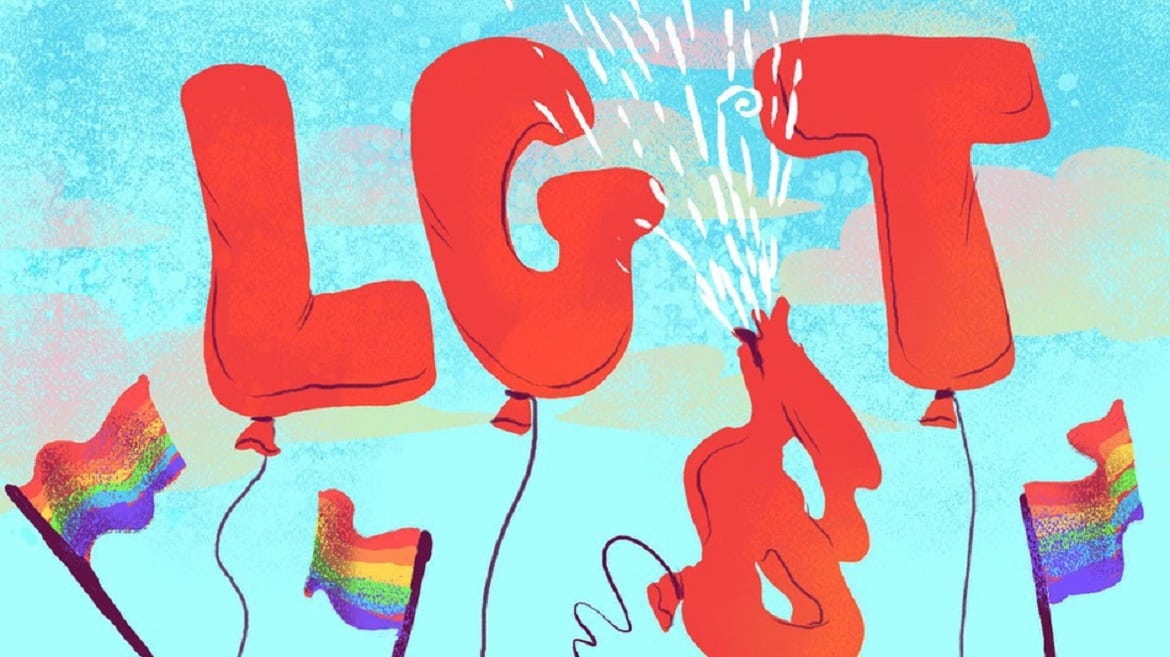
There’s No Pride: The Deafening Silence The LGBTQ Community Faces In South Asian Circles
Lifestyle Jun 11, 2018
The rising temperatures and the earthy smells of nature blossoming is a clear indication of summer approaching and the fabulous kickoff of Pride in June. While various communities are banding together to celebrate what has now become a noted month in the calendar, we explore what is obvious but not yet discussed or confronted: the deafening silence the LGBTQ community faces in South Asian circles.
Historically, June is Pride month in many places throughout the world and will be celebrated for the 42nd year since the Stonewall Riots in the United States, which contributed to starting the conversation and movement for civil rights for individuals who identify with the LGBTQ community.

While Pride festivities are often seen as a time of celebration and cheer, it really is an opportunity to raise awareness and educate people who may be fearful or lack understanding of what it means to identify as LGBTQ (lesbian, gay, bisexual, transgender and queer). In spite of the progress made, in terms of awareness and gaining rights, especially in larger cities throughout the world there is still a community of individuals under the overarching LGBTQ umbrella that continue to struggle with the negative stereotypes and lack of understanding that surrounds their sexual orientation: bisexuals.
What is Bisexuality?
In all honesty, it is difficult to define, as it can mean different things to each person. For example, “people within the bi+ community define [bisexuality] in various ways. Some identify as bisexual, while others use pansexual, queer, fluid, or no label at all to describe their attractions to more than one gender.” In fact, according to Hasina Juma, the attraction may not necessarily be split 50/50 between male and female, instead, it could be 60/40 or 80/20.

That being said, while there is turmoil, within the LGBTQ community, insofar that bisexuality is often dehumanized and people who identify as such can be ‘othered,’ there seems even more in the South Asian community as the topic is often met with silence, which is even more problematic.
To begin with, it is pivotal to address the many misconceptions, according to GLADD, surrounding bisexuality that causes it to be viewed negatively, such as:
- Bisexuality is just a phase before someone comes out as gay or lesbian.
- All women are bisexual or there are no bisexual men.
- One cannot identify as bisexual unless they have been in a relationship with both a man and a woman.
- One cannot identify as bisexual unless they both like both men and women equally.
- Bisexuals must be in a relationship with both a man and a woman at the same time in order to be happy.
- Bisexuals are promiscuous, polygamous, and/or immoral.
- Bisexuals are transphobic.”
These misconceptions, when intersected with South Asian culture, gender, religion, and even where you live in the world can contribute to additional difficulties and marginalization. Currently, the level of acceptance about bisexuality (let alone any sexual orientation outside of heterosexuality as the LGBTQ community is still largely invisible) and intersecting factors, such as religion and culture make it increasingly difficult to find a safe place of belonging.

The South Asian Culture Makes The Thought Of Coming Out Daunting
First, according to Satrang and the South Asian Network, there are social constructs that are unique to the South Asian culture, in that “families are considered an interdependent group, where the ‘whole’ is cared for by all. Privacy is ‘familial,’ not personal. Each person is ‘responsible for fulfilling many family obligations, such as enhancing the family’s reputation.’” As well, the custom of arranged marriages makes it hard for “…younger generations who want to please the parents but also acculturate and assimilate.”
In addition, there is the idea that seeking professional counselling to manage one’s mental health or even to try to unpackage and deal with conflicting feelings struggling with your sexual orientation might bring about is feared. Getting help is highly stigmatized in the South Asian community as it infers a “lack of personal strength and self-control.” Families also feel hurt if you go outside of the home to talk about your feelings. However, as Hasina Juma, creator of blog Beautiful Friday, points out, within South Asian households, dealing with your emotions is not often taught, and so, it can be necessary to step out to learn how to do so in a healthy way. Juma is aware of the benefits of seeking professional help and believes that her own coming out experience benefited from it.
Along with the social constructs that make navigating sexual orientation under the confines of a restrictive culture difficult, there is the fact that there is a lack of visibility or representation in Bollywood of LGBT. I believe that this lack of representation in Bollywood is crucial to discuss as this industry is undoubtedly a significant part of the South Asian culture and often reinforces social, economic, and political ideals.
It is not to say that bisexuality has not been seen on the big screen in Bollywood cinema. Rather, the issue lies in how bisexuality has been depicted when displayed in order to comply or be in line with laws and the culture. Often, characters who are identified as being part of the LGBT community are portrayed in a negative manner on screen. For instance, “as a society, we are programmed to view films on LGBT community only as a depiction of their lives – as it is – an oppressed, isolated, outcasted life.”

Destructing The Idea Of Living A Double Life: Juma’s Story
These factors all come together, making it more difficult for the individual who is trying to figure out how to be true to themselves in reality. Unfortunately, many South Asians go on to lead double lives to avoid disrupting the social norms ingrained into the fabric of their community, thus perpetuating the lack visibility about bisexuality, let alone the LGBT community as a whole.
However, Hasina Juma, who wears many hats, is the creator of the blog Beautiful Friday and works as a Senior International Relations Officer full-time (which likely helps make her better able to communicate), is here to break the silence as she recognized a need for it during her struggle with her sexual orientation.

In speaking with Juma, she candidly acknowledged that in July 2015, she had reached her ‘rock bottom’ moment in which she knew she needed professional help to make a “transformational change…to get to a place where she [could] feel empowered and happy.” Subsequently, she began attending counselling sessions, the purpose of which was to figure out how to come out to her parents, but first, she had to “learn how to feel [and] communicate her feelings.”
She was able to attend counselling online, in secret, at the time, to overcome the dark emotions of “guilt and shame” due to the learned beliefs she had been taught. For example, she thought “God would punish her because of [her] sexual orientation [and she] felt it was a defect.”
But, once Juma was able to reframe the negative attitude about her sexual orientation, she called a meeting on January 27, 2016, with her immediate family members. She highlighted that “this news doesn’t define who I am, but it’s a piece of me that’s important.” She came out and told them she is a bisexual and defined the term, explained why she’d kept it a secret, why she was telling them, and about the process she’d gone through to get to this point.
Juma believes that “because she’d gone for professional counselling, the way [she] delivered [her truth] came from a place of love and compassion.” As such, her delivery allowed for more understanding and exemplified the bravery associated with really explaining yourself from the heart.
Her family responded to her admission by saying “they love [her] for who she [is],” and noted that while they “are not necessarily familiar with the LGBT community,” they were willing to learn and asked, “how they could support [her].” The encouraging reaction from her family “meant the world to [Juma] because your blood family [is made up of] the people closest to you and [if no one else accepts you] at least you know your immediate family [does].”
At 34 years old, Juma was finally able to be true to who she was.
Though, throughout Juma’s journey, she began to realize there was a lack of support and resources for South Asians and people of colour, as a whole, who were struggling with their sexual orientation. However, in hindsight, this speaks volumes about the fact that there continues to be a lack of visibility and support for South Asians who identify with the LGBT community.
With this recognition and her own lonely experience fueling her, Juma launched her Facebook blog, “as a way to bring a voice to bisexuality.” The goal of the blog “is to share [her] experience in a raw and authentic manner so…it can inspire others to move forward in their journey of personal growth.”

The response to the blog has been positive as people have acknowledged how vulnerable her posts have been as she not only captures, in a relatable manner, what she is going through but also explores the complexities. Her followers have also applauded her for talking about bisexuality at a time in which neither the South Asian community or corresponding religious communities are not speaking about it.
Most recently, she launched her website, Hasina Juma, where she continues to share her story and resources, such as helpful infographics that range from defining terms to pieces that breaks down the process of coming out. Her prolonged struggle with her sexual orientation led to her experiencing feelings of isolation and loneliness, and so she has also launched a support group so that bisexual persons of colour have a safe space to go to where they can discuss their successes or any difficulties they’re experiencing.

So what’s next for this rising leader? A whole lot!
Moving forward, Juma will expand the efforts of her passion project by continuing to build her website. Throughout Pride month, she is doing a video series using Facebook Live (don’t miss it, trust me) to raise awareness about bisexual people of colour in an effort to humanize the topic.
In the long-term, Juma wants to attend events and conferences to raise awareness about bisexuality, along with “adding a research component to [her] website” by partnering with academic institutions “to do specific studies on people of colour [in the LGBT community] because there’s very little research that’s been done.” She also hopes to collaborate with other South Asians or persons of colour to capture different messages and reach a larger audience to help people ultimately better themselves.
Bisexuality in South Asian culture is very taboo and continues to be a silent struggle for many. However, Juma’s blog and activism, by way of her sharing her story and opening up the conversation for others to relate to and, hopefully, feel safe and motivated to participate in, is a step in the right direction when it comes to addressing the elephant in the room. All of that being said, Juma truly is “blazing a trail” that will be “soul saving” for those bisexual South Asians and persons of colour who are fighting this silent battle.
Main Image Photo Credit: www.medium.com
Devika Goberdhan | Features Editor - Fashion
Author
Devika (@goberdhan.devika) is an MA graduate who specialized in Political Science at York University. Her passion and research throughout her graduate studies pushed her to learn about and unpack hot button issues. Thus, since starting at ANOKHI in 2016, she has written extensively about many challe...













































































































